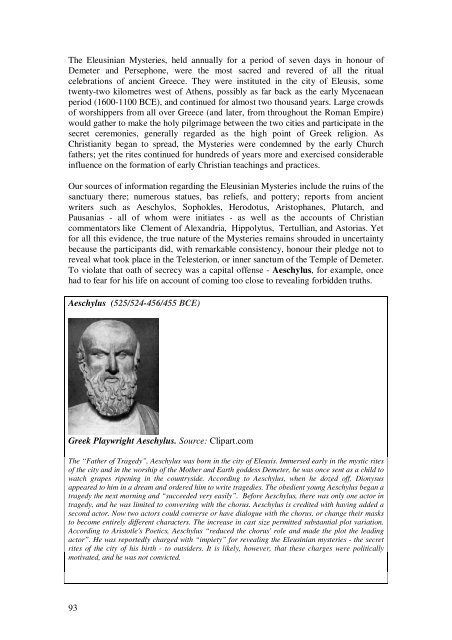Paganism an overview introduction - South African Pagan Council
Paganism an overview introduction - South African Pagan Council
Paganism an overview introduction - South African Pagan Council
You also want an ePaper? Increase the reach of your titles
YUMPU automatically turns print PDFs into web optimized ePapers that Google loves.
The Eleusini<strong>an</strong> Mysteries, held <strong>an</strong>nually for a period of seven days in honour of<br />
Demeter <strong>an</strong>d Persephone, were the most sacred <strong>an</strong>d revered of all the ritual<br />
celebrations of <strong>an</strong>cient Greece. They were instituted in the city of Eleusis, some<br />
twenty-two kilometres west of Athens, possibly as far back as the early Mycenae<strong>an</strong><br />
period (1600-1100 BCE), <strong>an</strong>d continued for almost two thous<strong>an</strong>d years. Large crowds<br />
of worshippers from all over Greece (<strong>an</strong>d later, from throughout the Rom<strong>an</strong> Empire)<br />
would gather to make the holy pilgrimage between the two cities <strong>an</strong>d participate in the<br />
secret ceremonies, generally regarded as the high point of Greek religion. As<br />
Christi<strong>an</strong>ity beg<strong>an</strong> to spread, the Mysteries were condemned by the early Church<br />
fathers; yet the rites continued for hundreds of years more <strong>an</strong>d exercised considerable<br />
influence on the formation of early Christi<strong>an</strong> teachings <strong>an</strong>d practices.<br />
Our sources of information regarding the Eleusini<strong>an</strong> Mysteries include the ruins of the<br />
s<strong>an</strong>ctuary there; numerous statues, bas reliefs, <strong>an</strong>d pottery; reports from <strong>an</strong>cient<br />
writers such as Aeschylos, Sophokles, Herodotus, Aristoph<strong>an</strong>es, Plutarch, <strong>an</strong>d<br />
Paus<strong>an</strong>ias - all of whom were initiates - as well as the accounts of Christi<strong>an</strong><br />
commentators like Clement of Alex<strong>an</strong>dria, Hippolytus, Tertulli<strong>an</strong>, <strong>an</strong>d Astorias. Yet<br />
for all this evidence, the true nature of the Mysteries remains shrouded in uncertainty<br />
because the particip<strong>an</strong>ts did, with remarkable consistency, honour their pledge not to<br />
reveal what took place in the Telesterion, or inner s<strong>an</strong>ctum of the Temple of Demeter.<br />
To violate that oath of secrecy was a capital offense - Aeschylus, for example, once<br />
had to fear for his life on account of coming too close to revealing forbidden truths.<br />
Aeschylus (525/524-456/455 BCE)<br />
Greek Playwright Aeschylus. Source: Clipart.com<br />
The “Father of Tragedy”, Aeschylus was born in the city of Eleusis. Immersed early in the mystic rites<br />
of the city <strong>an</strong>d in the worship of the Mother <strong>an</strong>d Earth goddess Demeter, he was once sent as a child to<br />
watch grapes ripening in the countryside. According to Aeschylus, when he dozed off, Dionysus<br />
appeared to him in a dream <strong>an</strong>d ordered him to write tragedies. The obedient young Aeschylus beg<strong>an</strong> a<br />
tragedy the next morning <strong>an</strong>d “succeeded very easily”. Before Aeschylus, there was only one actor in<br />
tragedy, <strong>an</strong>d he was limited to conversing with the chorus. Aeschylus is credited with having added a<br />
second actor. Now two actors could converse or have dialogue with the chorus, or ch<strong>an</strong>ge their masks<br />
to become entirely different characters. The increase in cast size permitted subst<strong>an</strong>tial plot variation.<br />
According to Aristotle's Poetics, Aeschylus “reduced the chorus' role <strong>an</strong>d made the plot the leading<br />
actor”. He was reportedly charged with “impiety” for revealing the Eleusini<strong>an</strong> mysteries - the secret<br />
rites of the city of his birth - to outsiders. It is likely, however, that these charges were politically<br />
motivated, <strong>an</strong>d he was not convicted.<br />
93


